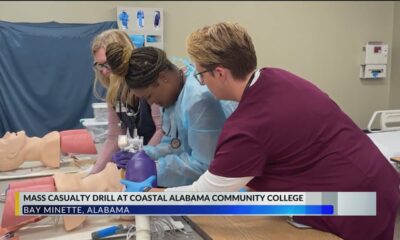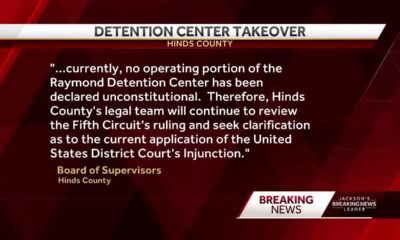Mississippi News
How Jackson’s water system made it a focus in America’s infrastructure crisis
How Jackson’s water system made it a focus in America’s infrastructure crisis
Nearly nine months to the day a winter storm froze Jackson’s water system, James Brooks is boiling his tap water. Again.
It’s maybe the third or fourth time this year. He isn’t sure.
Brooks, 79, wakes up every day before 6 a.m. to boil two pots of rain water just to make sure the dishes he put through the dishwasher the night before are sanitized. Gallons of distilled water purchased by his family members are used to make coffee and tea.

At his home in Jackson, Miss., James Brooks and his wife, Jean, boil their dishes in captured rainwater every morning after putting them through the dishwasher, which uses water from the city.
“This is a lot of work and it turns into a way of life,” Brooks said.
November’s citywide water outage was the latest iteration of more than 50 years of failures to properly maintain the city’s water and sewer systems.
“Our water system is in a constant state of emergency because of the systems we have,” Jackson Mayor Chokwe Antar Lumumba said at a Nov. 18 press conference.
This time, it was a bad batch of chemicals. In May, there was an electrical fire. In February, winter storms crippled the water and sewer systems for a month. And those are just the problems in getting water to come out of the tap.
For years, Jackson residents have questioned whether their water was safe to drink. In 2015, high levels of lead were found in the city’s drinking water.
Since that year, two-thirds of all water samples taken in Jackson have contained at least a trace amount of lead, according to records reviewed by the Clarion Ledger.
Many residents, including elected officials, say they cannot remember the last time they had a sip of Jackson’s tap water.
Lumumba declined an interview request for this story and to answer a list of questions about the city’s water systems, including questions about how to restore residents’ trust in the tap water.
Monday, during his weekly press conference, Lumumba said he and his family, which includes his wife and two young children, do drink the tap water.
”The challenges with our water system by and large have not been a matter of quality as it has been a matter of distribution,” Lumumba said.
Both the water and sewer systems need significant repairs and upgrades, with city officials facing pressure from the Environmental Protection Agency to act. In June, EPA and Jackson officials entered into an agreement establishing a plan for some of the fixes to happen. An agency spokesperson said many of the fixes are past due.
”Under the comprehensive equipment repair plan, 40 tasks have now come due,” the spokesperson said. The ”EPA and the state are working with the city on the tasks they are required to take to ensure completion.”
Six years after EPA violations, lead still present in Jackson’s water
Trouble paying attention in class. Lower IQs. Poor behavior.
Long-term lead exposure can cause myriad issues in children, with younger kids especially susceptible to lead poisoning, said Kristine Willette, professor of pharmacology and environmental toxicology at the University of Mississippi.
Data from the Mississippi State Department of Health and the Mississippi Urban Research Center at Jackson State University found Hinds County has the highest rate of childhood lead poisoning in the state.
In 2015, the EPA found Jackson to be in violation of the federal Lead and Copper Rule after discovering high lead levels in some of the city’s water samples. Federal mandates state a city’s water must not exceed lead levels of 15 parts per billion — equivalent to 15 drops of water in a swimming pool — in the highest 10% of its samples. Jackson’s lead levels were almost double that at the time.
Since 2015, 90 of the 1,352 water samples collected have exceeded the lead limit, according to a Clarion Ledger review of Jackson water testing records.
No amount of lead is safe for children under the age of 6 and pregnant or nursing people, according to the Centers for Disease Control and Prevention.
Experts estimate 20% of the lead people are exposed to comes from their drinking water. For newborns, as much as 60% of lead exposure can come from formula prepared with tainted tap water, according to SipSafe, a Mississippi State University initiative aimed at reducing lead in water supplies.
Federal agencies have different standards for acceptable lead levels in drinking water. Bottled water, which is regulated by the Food and Drug Administration, is supposed to have less than 5 parts per billion of lead.
SipSafe Director Jason Barrett predicts the EPA will eventually lower the acceptable amount of lead in the water to be more in line with the FDA, and to encourage water systems to address the issue.
If Jackson’s water was held to the FDA standard, 142 more samples would be in violation of lead limits.
While the amount of lead in the water is decreasing, it remains present. Through the first half of 2021, about two-thirds of the 160 samples tested contained at least a trace amount of lead, though only three exceeded the EPA limit.
When water is improperly treated, or corrosive, it can cause lead from old pipes or plumbing fixtures to leach into what comes out of the tap.
The EPA has worked with Jackson to implement proper corrosion control methods, and the agency expects Jackson’s water to be in compliance sometime in 2022, an agency spokesperson said.
A class-action lawsuit filed in federal court on behalf of 600 children alleges Jackson knowingly exposed the population to lead, stunting development and causing learning disabilities.
“I have always loved this city, but Jackson officials have shown little respect for my family and children living here,” Amanda Williams, mother of one of the plaintiffs, said in a statement about the case. “How could the people we elected to help us do so much harm to us instead? And how could it have gone on so long?”
’Nobody has confidence in it’
Legacy cities with aging infrastructure are a product of decades of white flight and disinvestment rooted in racism, said Manuel Teodoro, professor of public affairs at the La Follette School at University of Wisconsin-Madison. The effect is amplified when city leaders opt to defer maintenance or a public utility is poorly managed, he said.
In some ways, Jackson is the poster child for all of the above. Property values are abysmal, the population is shrinking and Jackson’s water and sewer utility is under financial duress.
The Jackson water and sewer utility serves an area of 150 square miles — bigger than the city of Philadelphia, despite Jackson only having a tenth of the population. At least 112 miles of city pipes are more than a century old, according to research from Jackson State Professor Jae-Young Ko.
Decades of population loss — Jackson has lost a fifth of its residents in the last 40 years — means the city collects less water revenue than the system was built for.
The shrunken customer base, coupled with 2013’s ill-advised water billing contract and years of not collecting water fees from residents, has left Jackson unable to afford the needed fixes.
Despite acknowledging the need for a vibrant capital city, Mississippi’s white Republican leadership has been disinclined to help fund the repairs for anything outside the capitol area in the majority Black, Democratic city.
Jackson’s residents are caught in the middle. People who have lived in the city for generations are scared of what comes out of their tap and skeptical help will ever come.
“I couldn’t tell you,” U.S. Rep. Bennie Thompson said of the last time he drank Jackson’s tap water. “Nobody has confidence in it, but you want it to work.”
Millions in funding. A handful of plans. Little to show.
The lack of improvements isn’t due to poor planning. Variations of master infrastructure plans dating back to 1997 sit in the city’s engineering offices. None have been fully completed.
Charles Williams Jr., Jackson’s city engineer, speaks to media during United States Environmental Protection Agency Administrator Michael S. Regan’s tour stop at the O.B. Curtis Water Plant in Ridgeland, Miss., Monday, Nov. 15, 2021.
“I have an office full of plans,” said Charles Williams, Jackson’s chief city engineer. “One thing that has been lacking is the implementation (of those plans) as it relates to resources.”
City officials estimate it could cost up to $2 billion to bring the city’s water and sewer systems into EPA compliance. The city collects about $60 million a year in water and sewer billing, about 3% of what it would take to fix the problems. Even if the city fixes its beleaguered billing system — the city has missed out on $83 million in water revenue since 2014 — the money won’t be enough.
Mississippi is sitting on billions of dollars of federal aid.
The recently passed $1.2 trillion federal infrastructure package is sending $459 million to the Magnolia State for water and sewer upgrades specifically. The state received $1.8 billion in American Rescue Plan Act funds, which are largely intended to be spent on infrastructure improvements.
The Mississippi State Department of Health also secured an $825,000 Water Infrastructure Improvements for the Nation grant aimed at implementing new corrosion control methods in the city’s water system in June. Another $27 million in emergency funding was provided by the state through the Drinking Water State Revolving Loan Program at the EPA’s insistence and was signed off on in November.
“To have a successful Mississippi, we need a successful capital city,” Gov. Tate Reeves said during a news conference outlining his 2022-23 budget proposal.
State officials, however, haven’t gone out of their way to help Jackson. In March, as city residents had gone weeks without water, Reeves balked at the idea of issuing emergency funding to the city, instead chastising city officials.
“I do think it’s really important that the city of Jackson start collecting their water bill payments before they start going and asking everyone else to pony up more money,” he said at the time.
Jackson has the second largest percentage of Black residents of any city in the nation. Jackson’s Black state legislators say their white Republican counterparts’ failure to aid the capital city is racist.
“The reason they don’t want to do it is because the city is predominantly Black,” State Rep. Alyce Clarke said. “We don’t want to talk about race issues. I don’t like to talk about race issues. But it is a problem.”
A problem hard for state leadership to ignore. Residents left waiting.
Despite the challenges, there is hope that Jackson will receive some of the needed funds to begin solving its problems. Democrats and Republicans have pointed to the available federal funds as a way to complete transformative infrastructure projects with generational impact.
Reeves, in his 2022-23 budget press conference, indicated the state would be willing to fund Jackson’s projects if the city spends some of its own American Rescue Plan Act funds on them.

Jackson’s mayor is cautiously optimistic the state will help, and that Reeves’ and other Republican’s words aren’t hollow. The continued media spotlight on Jackson’s ongoing water crisis should make it hard for state leadership to ignore, Lumumba said at the November press conference.
“If that does not take place then I think that that’s a question for our residents, for Mississippians to lift up and ask why we are still dealing with these inequities,” Lumumba said.
Even if enough money is provided through state and federal resources, Williams said the work would take 10 to 15 years to complete. All the while, Jackson’s residents, who have heard fixes are coming before, will be left waiting.
The lack of progress means people like James Brooks, who can hardly remember a time the water was drinkable, will continue living without something they need.
”When we are in need, that’s what government is for — to take care of people in need,” Brooks said in March, when the water hadn’t flowed for weeks.
This report was produced in partnership with the Community Foundation for Mississippi’s local news collaborative, which is independently funded in part by Microsoft Corp. The collaborative includes the Clarion Ledger, the Jackson Advocate, Jackson State University, Mississippi Center for Investigative Reporting, Mississippi Public Broadcasting and Mississippi Today.
This article first appeared on Mississippi Today and is republished here under a Creative Commons license.
Mississippi News
Events happening this weekend in Mississippi: December 20-22
SUMMARY: This weekend (December 20-22), Mississippi offers a variety of festive events. In Jackson, enjoy Food Truck Friday, candlelight concerts, a Grinch movie screening, and Journey to the North Pole. In Ridgeland, experience Merry Bingo, Christmas on the Green, and Fleet Feet Coffee Run. Vicksburg hosts Rock the Halls, while Natchez offers a European Christmas Shopping Village. Other activities include Santa scuba diving at the Mississippi Museum of Natural Science, Million Dollar Quartet Christmas, and Magic of Lights in Brandon. Hattiesburg features Lights of the Wild and Teddy Bear Tea with Santa. Numerous holiday events are available across the state.
The post Events happening this weekend in Mississippi: December 20-22 appeared first on www.wjtv.com
Mississippi News
Attorneys seek protective order in Jackson bribery case
SUMMARY: Prosecutors in Jackson are seeking a protective order to prevent the release of sensitive information in a bribery case involving Hinds County District Attorney Jody Owens, Jackson Mayor Chokwe A. Lumumba, and City Councilman Aaron Banks. The motion aims to protect personal, financial, and grand jury information, fearing it could impair investigations and fair trial rights. The three officials face charges related to a bribery scheme involving $80,000 in bribes for approving a real estate development project. Other individuals, including former City Councilwoman Angelique Lee and Sherik Marve Smith, are also implicated, with Smith pleading guilty to conspiracy.
The post Attorneys seek protective order in Jackson bribery case appeared first on www.wjtv.com
Mississippi News
Suspect in the killing of UnitedHealthcare’s CEO struggles, shouts while entering courthouse
SUMMARY: Luigi Nicholas Mangione, a 26-year-old Ivy League graduate, was arrested in Pennsylvania and charged with the murder of Brian Thompson, CEO of UnitedHealthcare. Mangione, who expressed disdain for corporate greed and the health insurance industry, was found with a gun matching the murder weapon and fraudulent IDs. He initially gave false identification but was recognized at a McDonald’s. Mangione, who wrote a three-page document expressing anti-corporate sentiments, is being extradited to New York. His family, shocked by his arrest, expressed condolences to Thompson’s family. Mangione had no prior criminal complaints but had a history of severe back pain.
The post Suspect in the killing of UnitedHealthcare’s CEO struggles, shouts while entering courthouse appeared first on www.wjtv.com
-

 News from the South - Arkansas News Feed6 days ago
News from the South - Arkansas News Feed6 days agoFaith-inspired ministry opens health clinic in Little Rock
-

 News from the South - Florida News Feed5 days ago
News from the South - Florida News Feed5 days ago‘Dirty Dancing,’ ‘Beverly Hills Cop,’ ‘Up in Smoke’ among movies entering the National Film Registry
-

 Our Mississippi Home5 days ago
Our Mississippi Home5 days agoThe Meaning of the Redbird During the Holiday Season
-

 Mississippi Today4 days ago
Mississippi Today4 days agoMississippi PERS Board endorses plan decreasing pension benefits for new hires
-

 Local News1 day ago
Local News1 day agoHard Rock Hotel & Casino Biloxi Honors Veterans with Wreath-Laying Ceremony and Holiday Giving Initiative
-

 News from the South - Missouri News Feed2 days ago
News from the South - Missouri News Feed2 days agoCould prime Albert Pujols fetch $1 billion in today's MLB free agency?
-

 News from the South - North Carolina News Feed1 day ago
News from the South - North Carolina News Feed1 day agoSocial Security benefits boosted for millions in bill headed to Biden’s desk • NC Newsline
-

 Mississippi Today6 days ago
Mississippi Today6 days agoOn this day in 1976


































